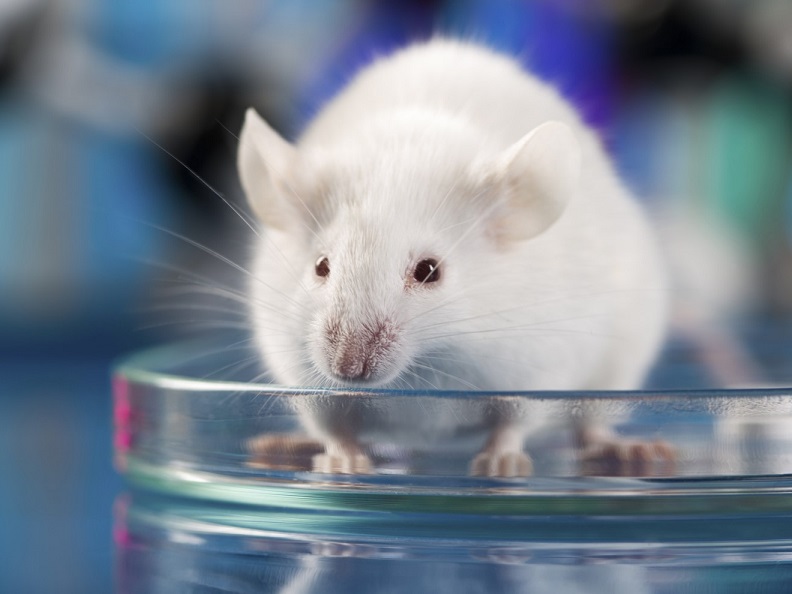
细菌吃药:减少小鼠心脏病风险
Drugged Gut Microbiome Cuts Heart Risk in Mice
细菌吃药:减少小鼠心脏病风险
A compound found in extra virgin olive oil and red wine reduced mice’s risk of clogged arteries.
一种在特级初榨橄榄油和红酒中找到的化合物能减少小鼠动脉阻塞的风险。
撰文/播音 克里斯托弗·因塔利亚塔(Christopher Intagliata)
翻译 Meatle
审校 邰伦玥
The microbes in our gut play a big role in helping us digest our food. But as they break down nutrients, they also generate secondary compounds that can influence our health. Take carnitine, or lecithin—substances found in red meat. When your gut microbes break them down, the bugs excrete the waste product trimethylamine, TMA. Which your liver enzymes convert to trimethylamine-N-oxide, TMAO, a substance that ups the risk of heart disease.
我们消化道中的微生物在消化食物方面起着重要的作用。然而在它们分解食物的同时,它们也产生了一些影响我们身体的副产物。例如在红肉中常见的肉毒碱或是卵磷脂,当肠胃细菌降解这些物质时,这些微生物会排泄出三甲胺(TMA)。三甲胺在肝脏的酶的作用下,转化为会提升心脏疾病风险的物质——氧化三甲胺(TMAO)。
But this effect isn't limited to red-meat eaters. "We're constantly feeding our gut microbes these compounds. Even in the most ardent vegetarian or vegan it happens." Stanley Hazen, a physician in preventive cardiology at Cleveland Clinic. "Every time you eat, even when you eat a pickle or a cucumber or a pure piece of lettuce, once you eat something, your gallbladder contracts and squirts some bile into the intestines to try to help digest the food." And even bile, he says, has compounds, like lecithin, that gut microbes digest into TMA.
然而这种影响并不局限于红肉爱好者。“我们持续不断地用这些化合物喂养肠胃微生物。甚至狂热素食者或者严格素食者也不例外。”克利夫兰诊所的预防心脏病学医师,斯坦利·哈森说,“每一次进食,即使吃下的是泡菜、黄瓜或是单纯的一片生菜,一旦吃下了东西,胆囊就会收缩,挤出一些胆汁进入到肠道以帮助消化。”而即使是胆汁,也含有像卵磷脂的化合物,会被肠道细菌转化为TMA。
So why not block the gut microbes from making TMA in the first place? Hazen and his colleagues found a substance that does just that. It's a kind of butanol called DMB, and it's found in extra-virgin olive oil, grapeseed oil, and some red wines and balsamic vinegars. When mice ate DMB, the compound blocked the gut bacteria from producing TMA—which in turn prevented clogged arteries in the animals.
那为何不在源头上阻止细菌差生这些物质?哈森与他的同僚发现了一种物质,刚好有这种作用。这种物质是一种被称为DMB的丁醇类物质。这种物质可以在特级初榨橄榄油、葡萄籽油、红酒或意大利黑醋中找到。当小鼠摄入了DMB,DMB会阻止肠道细菌生成TMA,换句话说,DMB防止了小鼠产生心肌梗塞。
"I kind of like to think of this as a statin for microbes. When we take a statin, or something that blocks cholesterol synthesis in our body cells, we're not killing the cell, we're just preventing the body from making cholesterol. In an analogous way, this is preventing the microbe from making TMA, and that therefore in the host reduces TMAO levels and is reducing diet-induced atherosclerosis." The study is in the journal Cell. [Zeneng Wang et al, Non-lethal Inhibition of Gut Microbial Trimethylamine Production for the Treatment of Atherosclerosis]
“某种程度上,我认为这是一种微生物的抑制素。当我们吃下了抑制素,或是其他抑制细胞中的胆固醇生成的物质,我们并没有杀死这些细胞,我们只是阻止身体中产生胆固醇。类似地,DMB阻止微生物产生TMA,而这样会在源头上减少TMAO的水平,并且减少食源性的动脉粥样硬化。”这项研究刊登在Cell上。
As for whether this finding explains the heart-healthy benefits of the Mediterranean diet for humans? "We haven't studied the Mediterranean diet. But you can start connecting the dots. And I think that is an area where future studies need to go." Until then, no harm in a little olive oil—especially if you’re putting it on a nutritious salad.
至于这项研究是否解释了地中海式饮食对人类心脏健康方面的好处,“我们尚未对地中海饮食进行研究。但若你开始把这些信息串连起来。我也相信,这将是我们后续研究的方向。”在那之前,一点儿橄榄油应该是没有害处的,尤其是加在营养满满的沙拉里时。
未经书面许可任何人不得复制或镜像
京ICP备11000850号-1
 京公网安备11010502039775号
京公网安备11010502039775号 信息网络传播视听节目许可证0111611号
国家科技基础条件平台

















